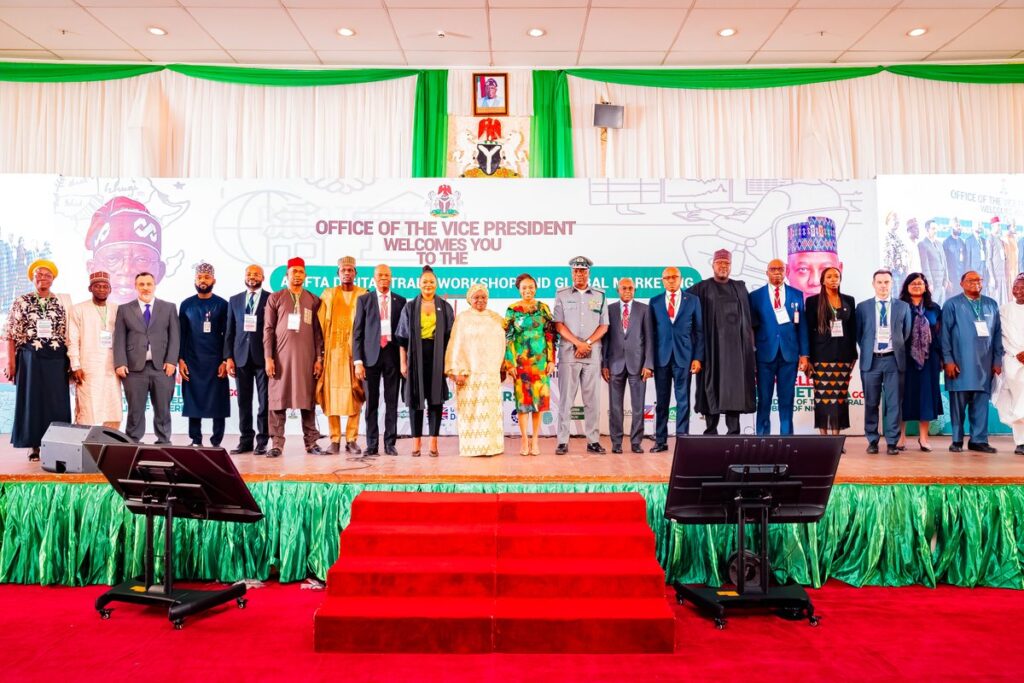Nigeria has been designated as Africa’s Digital Trade Champion, a recognition that could drive the creation of over 10 million new jobs across the continent by the end of 2025.
This development affirms Nigeria’s leadership role in shaping Africa’s digital commerce landscape under the African Continental Free Trade Area (AfCFTA).
Vice President Kashim Shettima, represented by the Minister of Industry, Trade, and Investment, Jumoke Oduwole, reaffirmed Nigeria’s commitment to spearheading Africa’s digital trade agenda at the AfCFTA Digital Trade Workshop held in Abuja.
Themed “Unlocking State Exports Potential,” the workshop gathered federal and state officials, trade commissioners, and private sector experts to explore opportunities in digital trade.
“Our innovations in mobile payments have transformed cross-border transactions, boosting financial inclusion and digital commerce across the continent,” said Shettima.
READ ALSO: Five movie stars who transformed their looks for movie roles
He emphasized the need for rapid implementation of the AfCFTA Digital Trade Protocol, which aims to increase intra-African trade from 18% in 2022 to 50% by 2030.
Nigeria’s appointment as the continent’s Digital Trade Champion follows President Bola Tinubu’s pledge in December 2024 to lead Africa’s digital trade evolution.
The recognition was solidified at the 38th African Union Heads of State Summit, where Tinubu received commendations from former Nigerien President Mahamadou Issoufou, AfCFTA Champion.
The Vice President also announced that Nigeria’s Ambassador to the World Trade Organization (WTO), Adamu Abdulhamid, has been appointed chairperson of the Committee of Trade and Services Special Session, reinforcing the country’s strategic role in global trade discussions.
With over 109 million internet users and a thriving mobile economy, Nigeria is well-positioned to lead Africa’s digital trade transformation.
The continent’s digital economy is projected to grow to $180 billion this year, up from $115 billion in 2020.
Shettima highlighted government initiatives such as the National Talent Export Programme, the Outsource to Nigeria Initiative, and the 3 Million Technology Talents Programme as key drivers of this growth.
To further strengthen Nigeria’s digital trade infrastructure, the government has modernized its passport application system and invested in port infrastructure to streamline trade procedures, enhancing efficiency in customs processing and positioning Nigeria as a major trade hub in West Africa.
READ ALSO: Joe Ajaero Arrest: ‘No human rights violations’, says FG
Key stakeholders at the workshop, including Minister of Youth Development Ayodele Olawande, Kaduna State Governor Uba Sani, and Minister of Art, Culture, Tourism and Creative Economy Hannatu Musawa, underscored the potential of digital trade in boosting economic growth, supporting young entrepreneurs, and elevating Nigeria’s creative industry on a global scale.
Additionally, Nigeria Customs Service Comptroller General Adewale Adeniyi detailed new digital trade facilitation measures, including the launch of the ‘B’Odogwu’ platform to improve transparency and efficiency in exports.
Director General of the National Identity Management Commission, Engr. Abisoye Coker-Odusote, stressed the importance of digital identity systems in transforming Nigeria’s trade environment.
Representatives from the British High Commission, the Overseas Development Institute, and the AfCFTA Secretariat lauded Nigeria’s leadership and emphasised the importance of robust policy implementation to unlock the full potential of Africa’s digital trade framework.
As Africa moves towards deeper economic integration, Nigeria’s proactive role in digital trade could pave the way for increased economic diversification, job creation, and a globally competitive digital economy.



